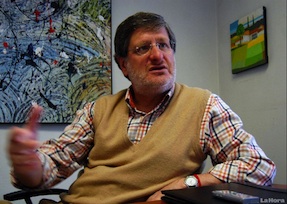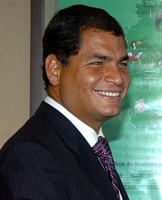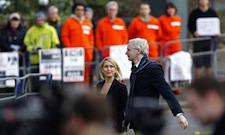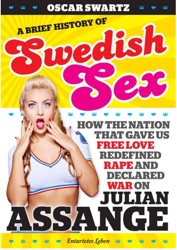After seeking asylum in Ecuador's London embassy, WikiLeaks' Editor-in-Chief Julian Assange asserted that Prime Minister Julia Gillard's Labor Party government in his native Australia had made an "effective declaration of abandonment" by refusing to intervene in any extradition to Sweden or the USA. Now the Leader of the Opposition, Tony Abbott, has confirmed that Mr Assange can expect no better from Australia's Coalition parties.
WikiLeaks releases have shaken global politics and provoked countless news headlines. Founder Julian Assange has rarely been out of the media spotlight. And yet WikiLeaks' greatest revelations have scarcely been noticed by mainstream media journalists. Here at last, we expose the full story behind the stories that the corporate media are too scared to touch!

 Francisco Carrión is an Ecuadorian diplomat and political analyst. He is the ex-Foreign Affairs Minister of Ecuador, having also worked in the embassies in Paris, Madrid and London. After resigning as head of mission at the United Nations he began teaching at FLACSO University in Quito.
Francisco Carrión is an Ecuadorian diplomat and political analyst. He is the ex-Foreign Affairs Minister of Ecuador, having also worked in the embassies in Paris, Madrid and London. After resigning as head of mission at the United Nations he began teaching at FLACSO University in Quito.
The delay in Ecuador's answer to Mr. Assange's asylum bid hints at a deep think caused by the issue's complexity. What do you think are the key points of the debate?
 Entrevistamos a Francisco Carrión, diplomático y analista político ecuatoriano. Fue Ministro de Relaciones Exteriores de Ecuador y en su carrera en el exterior pasó por las embajadas de París y Londres, siendo nombrado embajador en Madrid. Tras su renuncia como jefe de la misión ante las Naciones Unidas dejó la profesión para ser profesor en la Universidad FLACSO en Quito.
Entrevistamos a Francisco Carrión, diplomático y analista político ecuatoriano. Fue Ministro de Relaciones Exteriores de Ecuador y en su carrera en el exterior pasó por las embajadas de París y Londres, siendo nombrado embajador en Madrid. Tras su renuncia como jefe de la misión ante las Naciones Unidas dejó la profesión para ser profesor en la Universidad FLACSO en Quito.
 "Catbird seat", noun: "an advantageous situation or condition"; "sitting pretty". This North American idiom readily applies to the current position of Ecuadorean President Rafael Correa, who was hoisted into the international spotlight when he recently became host to Julian Assange. As a result Correa has raised the global profile of his small nation of 14 million, and the tens of thousands of letters received by his embassy in the past ten days indicate that granting Assange asylum would instantly make him a global hero. With little economic dependence on the U.S., and with Assange at his disposal, Correa potentially holds significant leverage over Washington.
"Catbird seat", noun: "an advantageous situation or condition"; "sitting pretty". This North American idiom readily applies to the current position of Ecuadorean President Rafael Correa, who was hoisted into the international spotlight when he recently became host to Julian Assange. As a result Correa has raised the global profile of his small nation of 14 million, and the tens of thousands of letters received by his embassy in the past ten days indicate that granting Assange asylum would instantly make him a global hero. With little economic dependence on the U.S., and with Assange at his disposal, Correa potentially holds significant leverage over Washington.
Late Night Live Radio had Thiago de Aragao and Donald Rothwell on the program 26 June 2012 to discuss Julian Assange and his application for political asylum in Ecuador. Full audio is available at the ABC Radio website.
We are all forced by logic to respect this dichotomy:
Either the US threatens Julian Assange's freedom, or it does not.
However, the Washington Post editorial board, reflecting the US diplomatic position, prefer to have it both ways in the same article.
Julian Assange arrived at the Ecuadorian Embassy in London on June 19 to apply for political asylum. Since then, there has been mass coverage by the media, which often contains false and misleading information about his reason for applying, the threat he faces in the U.S., and the reaction from his supporters.
Julian Assange interview on ABC Radio National Breakfast, 21 June 2012. This is his first interview conducted since he applied for political asylum in Ecuador. At the time of this interview, Mr Assange had been at the Ecuadorian Embassy for three days. Full audio is available at the ABC Radio website.
 Julian Assange fue arrestado al emitirse una Alerta Roja de Interpol y una Orden Europea de Extradición tan solo cuatro días después de iniciar la más grande filtración d e información secreta de los Estados Unidos de América por los diarios con mayor distribución del mundo, en Diciembre de 2010.
Julian Assange fue arrestado al emitirse una Alerta Roja de Interpol y una Orden Europea de Extradición tan solo cuatro días después de iniciar la más grande filtración d e información secreta de los Estados Unidos de América por los diarios con mayor distribución del mundo, en Diciembre de 2010.
La orden se emitió para interrogarlo solamente. Un año y medio después de su arresto aún no existe ningún cargo en su contra y no está siendo procesado en Suecia. El caso aún se encuentra en la fase de investigaciones por lo que no está sujeto a proceso judicial alguno, en ningún país del mundo.
Julian Assange's mother Christine recently tweeted the following facts about extraditions involving the US, the UK, Sweden, and Australia.

This is our live-coverage on Julian Assange's request for political asylum. See the archives for coverage of previous days.

In 2008, University of Chicago Chair and former Stockholm University professor Don Kulick observed: "From being admired and envied by many as beacons of sexual enlightenment in the 1960s and '70s, the Scandinavian countries today have some of the most repressive sex laws in the Western world. Sweden is the most draconian. ... The message conveyed by [recent laws] is clear: your sexuality is the property of the state, and the state will claim its right to regulate and punish that sexuality, wherever you may be. So whatever, indeed, happened to sex in Scandinavia?"
 Although it does not directly answer Kulick's question, Oscar Swartz's new book, A Brief History of Swedish Sex: How the Nation That Gave Us Free Love Redefined Rape and Declared War on Julian Assange, traces the change that Kulick describes. Structured as a timeline, the volume vividly illustrates how a political coup by a group of radical feminists at the highest levels of government caused the free-love era of "Swedish sin" to give way to a wave of anti-sex and anti-male hysteria that vilified heterosexual sex and villainized men. It was into this morass that WikiLeaks leader Julian Assange waded when he had consensual sexual relations with Anna Ardin and Sofia Wilén -- and then became the target of a Sweden-initiated international manhunt.
Although it does not directly answer Kulick's question, Oscar Swartz's new book, A Brief History of Swedish Sex: How the Nation That Gave Us Free Love Redefined Rape and Declared War on Julian Assange, traces the change that Kulick describes. Structured as a timeline, the volume vividly illustrates how a political coup by a group of radical feminists at the highest levels of government caused the free-love era of "Swedish sin" to give way to a wave of anti-sex and anti-male hysteria that vilified heterosexual sex and villainized men. It was into this morass that WikiLeaks leader Julian Assange waded when he had consensual sexual relations with Anna Ardin and Sofia Wilén -- and then became the target of a Sweden-initiated international manhunt.

"Between 70 and 80 per cent of Australians
support the work of WikiLeaks..." Senator Scott Ludlam
Earlier today, I spoke to Greens Senator for Western Australia, Scott Ludlam, about the threat of extradition for WikiLeaks Editor in Chief, Julian Assange, in light of expanding US military presence in Asia Pacific and broadening military ties between Australia and the United States.

Theme by Danetsoft and Danang Probo Sayekti inspired by Maksimer